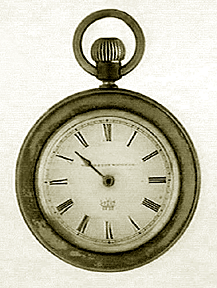the colonization of several arenas by celebrity logic.
I think this is relevant to us considering all three of us have solid evidence of the celebrities work being used to make a social or political point, and how the emotionalization of a certain issue can raise awareness in a way it otherwise couldn't.
 Waterbury watches were created using fewer parts than any other watch on the market at the time. They were very cheap, and described by Mark Twain as "simple sweet, and humble." I think this idea of being common but in a good way was to support how people felt toward Basil, and why he would not have an enemy.
Waterbury watches were created using fewer parts than any other watch on the market at the time. They were very cheap, and described by Mark Twain as "simple sweet, and humble." I think this idea of being common but in a good way was to support how people felt toward Basil, and why he would not have an enemy.